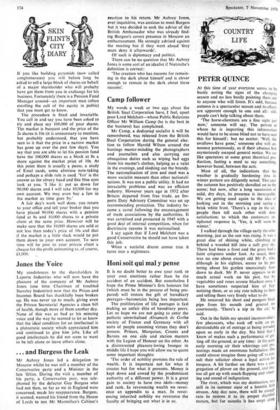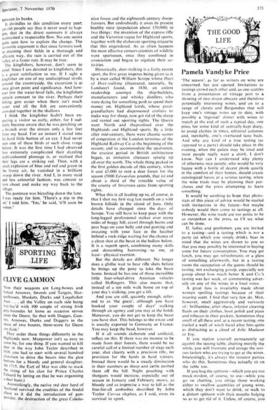PETER QUINCE
At this time of year everyone seems to be busily noting the signs of the changine season and no less busily pointing them out to anyone who will listen. It's odd, because autumn is a spectacular season and its effects are apparent enough to one and all: still, people can't help talking about them.
'The horse-chestnuts are a fine sight just now,' someone will say. The person to
whom he is imparting this information would have to be stone blind not to have seen this for himself: but no matter. 'Well, the
swallows have gone,' someone else will an- nounce portentously, as if their absence had mysteriously escaped general notice. We are like spectators at some great theatrical pro- duction, feeling a need to say something, however banal, between the acts.
Most of all, the indications that the weather is gradually hardening into its winter pattern are diligently noted. This year the autumn has positively dawdled on to the scene; but now, after a long succession of mild, dry days, its presence is inescapable. We are getting used again to the idea of looking out in the morning and seeing a brisk white frost. 'There's a nip in the air,' people then tell each other with dour satisfaction; to which the customary an- tiphonal response is, 'Yes, it will soon be winter.'
I walked through the village early the other morning, just as the sun was rising. It was a great disc of shining white, climbing up behind a wooded hill into a soft grey sky. There had been a frost and the grass had a faint crispness under foot. As usual, there was no one about except old Mr P., who. although in his eighties, seems to be pot- tering about his garden unceasingly from dawn to dusk. Mr P. never appears to do much actual work on his plot, but his vegetables and roses arouse blackest env-Y. I have sometimes suspected him of hyp- notising them, or at any rate talking to them and telling them very firmly what to do. He removed his short and pungent black pipe from his mouth and greeted me courteously. 'There's a nip in the air,' he said. Out in the fields my spaniel incommoded a few pheasants, who took off with an un- derstandable air of outrage at being intruded upon so early in the day. No bird that I know of-makes such a performance of get- ting off the ground, at any time: in the quiet early morning air their whirrings and pro- testings made an enormous hullabaloo. One could almost imagine them going off to con- sult their solicitor about a legal action for trespass. A bit further on there was a con- gregation of plover on the ground, and the) too all got up with much flapping and wheel- ing and sound of indignation. The river, which was my destination, was still in its summer state of a humble little stream. Any day now, there will be en0ugl! rain to restore it to its proper dignified stature, but for months it has crept along
between its banks.
It dwindles to this condition every year; yet old people say that it never used to hap- pen, that in the driest summers it always maintained a respectable flow. No one seems quite sure how to explain the change. The favourite argument is that since farmers took to draining their fields in a thorough and efficient way, the rain is carried out of the %alley at a faster rate. It may be true.
The kingfishers, however, don't seem to mind. Since I am devoted to kingfishers, this is a great satisfaction to me. If I sight a kingfisher on one of my undisciplined strolls around the countryside, the excursion is at once given point and significance. And how- ever low the water-level falls, the kingfishers remain constant to the river. Perhaps their fishing gets easier when there isn't much water and all the fish are conveniently crowded together in the shallows.
I think the kingfisher hadn't been ex- pecting a visitor so early, either, for I sud- denly became aware that he was perching on a branch over the stream only a few feet from my head. For an instant I stared into his hard little button of an eye. I had never seen one of these birds at such close range I before. It was the first time I had observed how extremely complicated their dazzling multi-coloured plumage is, or realised that their legs are a striking red. Then, with a small explosion of blue and red and green in the frosty air, he vanished in a brilliant swoop down the river. And I, in more staid and less colourful fashion, was content to turn about and make my way back to the village.
The postman was bicycling down the lane. I was ready for him. 'There's a .nip in the air,' I told him. 'Yes,' he said, It'll soon be winter.'























































 Previous page
Previous page